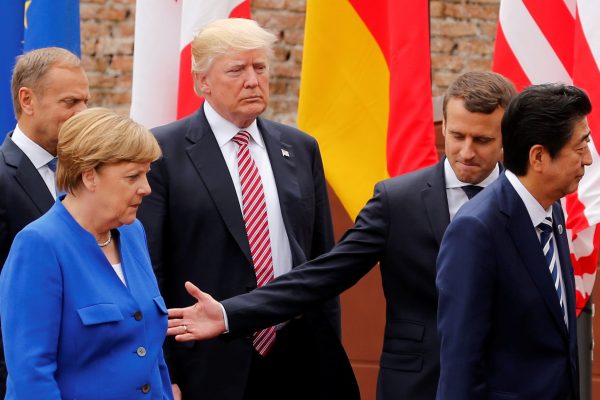For all the best intentions of the summit, it may only finally confirm that this cross-Atlantic alliance of democracies complemented by Japan is too fragmented and inward-oriented to generate new ideas, institutions, or contributions to global public goods.
Strikingly, Italian Prime Minister Giuseppe Conte and Spanish Prime Minister Pedro Sanchez are coming as mere caretakers after the implosion of their respective governments. Canadian Prime Minister Justin Trudeau has less than two months remaining before difficult general elections. EU Commission President Jean Claude Juncker is missing due to a health emergency. German Chancellor Angela Merkel is politically and personally weakened, while UK Prime Minister Boris Johnson is joining this G7 like a torpedo with one single target: getting US President Donald Trump to lend political fracas against the European Union in his pursuit of Brexit.
Only three leaders are actually autonomous and able to deploy political capital — Trump, French President Emmanuel Macron, and Japanese Prime Minister Shinzo Abe. But Trump’s erratic behaviour cannot be checked by the other two and is sufficient to ensure that no significant outcome is possible. In fact, citing Trump’s veto positions and in light of the G7 disaster last year in Quebec, Macron this week scrapped the idea of a G7 communique all together — focussing instead on ad-hoc declarations on some issues where enough countries are willing to play.
Despite the regalia and cachet of the G7 built over 44 years, there is more positive creative energy toward public goods in many Asian settings than at this G7, such as the ongoing Regional Comprehensive Economic Partnership negotiations or their flurry of bilateral and plurilateral initiatives. With the absence of China, India, Russia, and ASEAN — and given the deep confrontation between the United States and Europe over almost every significant issue — the G7 is unable to generate new global public goods or give meaningful signals to global markets.
China will likely escape meaningful attention. The G7 members do share some reactions when it comes to Hong Kong and Xinjiang, and may issue a carefully worded declaration urging for humane treatment and fulfilling international commitments. Yet, very little can be expected on the core issues involving China such as trade, climate, or the Iran crisis, given that the United States and Europe are deeply opposed on these critical issues.
The bilateral meeting between Abe and Macron may be important. Serious discussions are likely to take place on whether Europe, Japan, and other partners such as Canada and Australia are able to act together in protecting and improving the World Trade Organization (WTO), global economic governance, and the Paris Agreement.
But there remain a number of key issues on the agenda that will attract attention from all parties.
The IMF, the OECD, and other international institutions have all raised the red flag of a possible global recession ahead. A stock market correction or a financial crisis looks likely, at a time when most governments are out of fiscal and monetary ammunition. Most concerning of all is that under Trump’s leadership, relations among great powers and global governance regimes are so frayed that a collective response to a global crisis could become impossible. Will the G7 muster the courage to say anything meaningful about this incoming recession? It is hard to be optimistic.
The second emergency issue is without doubt the climate crisis (including the ongoing massive burning of the Amazon forest in Brazil), along with the crisis of biodiversity and the survival of oceans. The latest Intergovernmental Panel on Climate Change report made it clear that humanity has about 12 years to act decisively or face a period of assured chaos, hunger, mass migration and collapsing states. This reality is mobilising youth around the world. What will the G7 do on this? The United States will veto any grand vision, but more concrete practical resolutions can be expected on issues such as air conditioning, plastics, and the greening of banking.
The greatest security crisis of 2019 is probably the Iran crisis, engineered by the United States unilaterally pulling out of the UN-approved Joint Comprehensive Plan of Action and unleashing crippling sanctions on Iran. France and others are trying to nudge the United States toward a compromise, and then nudge Iran toward some concessions. The chances of success are very low, given that the United States is very unlikely to be nudgeable.
The G7 will also face the Kashmir crisis unleashed by Indian Prime Minister Narendra Modi’s unilateral constitutional change. Macron has asked Modi to come in person to discuss the move. This discussion can only be useful and important. But if not done carefully, it could also alienate Pakistan.
Amid the WTO crisis, and the US–China trade war crisis, the G7 should come up with an action plan to prevent the disintegration of the global trade regime. Yet, here too, apart from possible progress between Europe, Japan, and Canada, it is hard to foresee progress.
Macron has also planned a major discussion on the issues of inequality and gender, including with partner countries, hoping to produce a new vision and action plans. On these issues, some good ideas may be generated and some resolutions may be announced. But the impact is likely to be limited, given that fighting inequality cannot be separated from dealing with global trade and financial governance.
In sum, the G7 pageantry will offer little positive contribution to global systemic issues. Instead, the antics of Johnson and Trump may suck much of the oxygen. Some signs of hope may be found in lower-level concrete proposals emerging from well-intentioned year-long working groups on inequality, gender, environment, health, and African development.
Yves Tiberghien is Professor of Political Science at University of British Columbia (UBC), Distinguished Fellow at the Asia-Pacific Foundation and Vision 20 Co-Chair.

